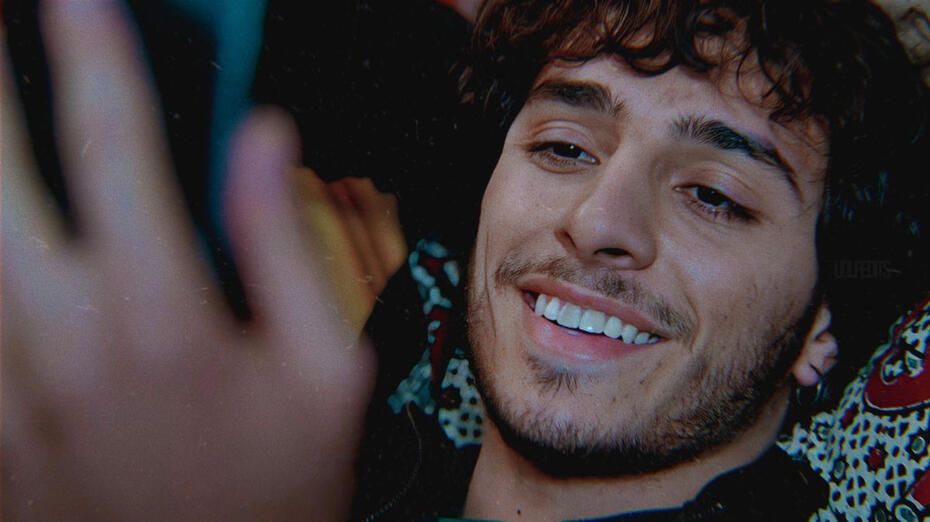
THE IMPORTANCE OF BISEXUAL REPRESENTATION DENIED IN "UN PROFESSORE"
On June 27 we will tweet from 5:30 pm to 7:30 pm the hashtags #JusticeForManuelFerro and #BringSimuelBack.We started this initiative because at the gates of 2024 it’s unacceptable that a sexual orientation, in this case bisexuality, is invalidated and reduced to a "controversial parenthesis", a "half a story" or to a "creative experience" by a television network which should represent Italy in the whole world.What is bisexuality?
Bisexuality is defined as the sexual orientation of a person who feels pleasure in having emotional and/or sexual relationships with people of both the same and opposite sex.What does it mean to invalidate and belittle bisexuality?
Refusal to accept this sexual orientation, like any orientation, makes people biphobic.What is biphobia?
“Biphobia” is a term used to describe aversion towards bisexuality and bisexuals as a social group or as individuals. People of any sexual orientation can experience such feelings of aversion. As a source of discrimination, biphobia is based on negative stereotypes about bisexuals.In recent weeks (from November 23 to December 21) the TV series "Un Professore 2" has aired on the first channel of Italian State TV. Un Professore was born as a remake of the Spanish series Merlí.By "remake" we mean the "remaking of a film/TV series which intends to repeat its emotional characteristics over time". The cast, the settings, the general culture will be different depending on the country that produces the remake (in Skam we can concretely see this example), but the guidelines of the storyline (including the ending) should be respected without distorting the identity of the main characters erasing their sexual orientation.This is exactly what we witnessed during this second season of Un Professore. In Merlì there are three main characters: the nonconformist professor Merlì (Dante), his homosexual son Bruno (Simone) and the bisexual friend Pol with whom Bruno will fall in love and get married (Manuel).
Here in Italy Manuel - due to the biphobic declarations of the main screenwriter Sandro Petraglia - has been transformed into a straight character and his path of discovery and acceptance, which timidly was about to begin at the end of the first season, was completely nipped in the bud and forgotten as if nothing had happened.Below is a "small" list of the ways in which this character's bisexuality has been debased in recent weeks by who has directly worked in the show (like screenwriters and actors) and by journalists:1) We thought of Manuel as a heterosexual who has this half-affair with Simone (Sandro Petraglia for Fanpage)2) For Manuel it's just an experience (Sandro Petraglia for Fanpage)3) Manuel is a creative, original character and within his creativity and intelligence, he also wants to explore everything he can explore (Sandro Petraglia for Fanpage)
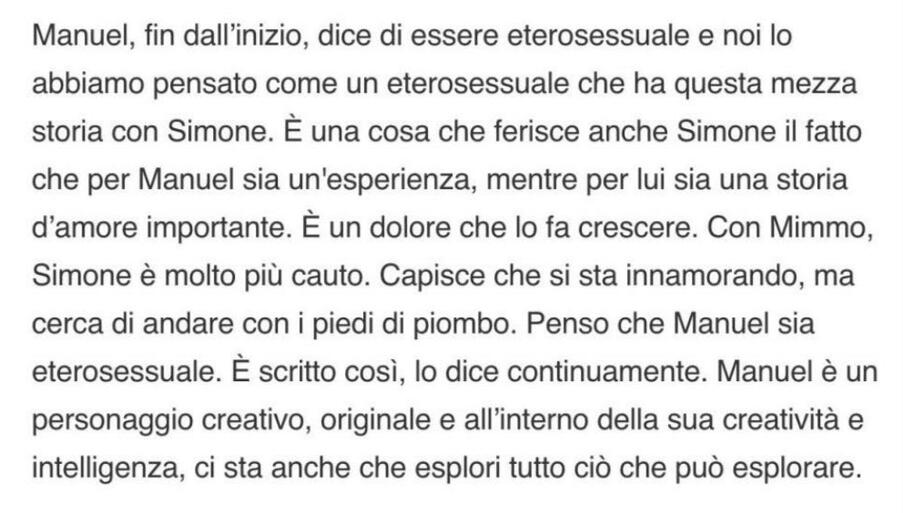
4) We are becoming the masters of fluidity (Sandro Petraglia for Fanpage)
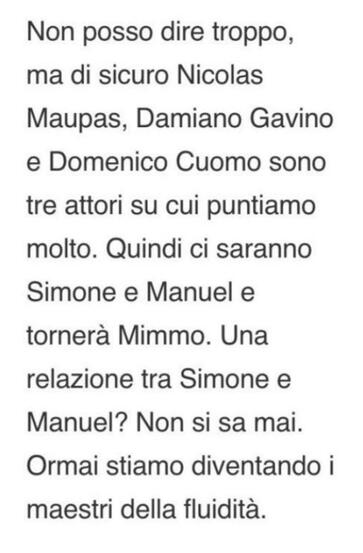
5) Indulge an impulse justified by a very strong relationship of brotherhood and friendship (Mario Manca via X)
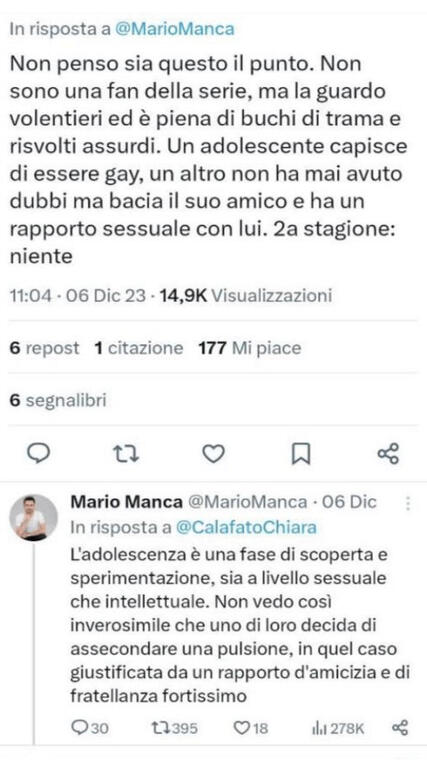
6) it was a one shot (Mario Manca via X)
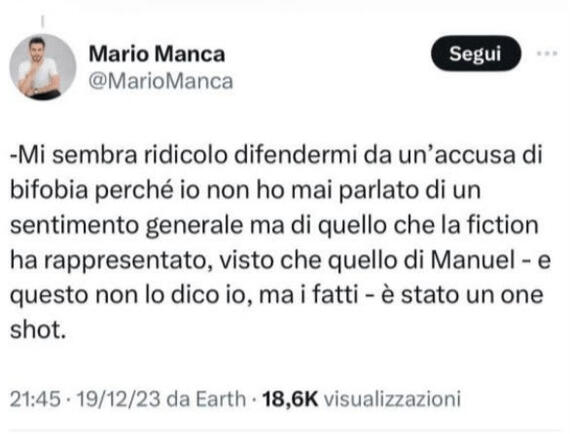
7) And if you are only attracted to that one guy because something moves you beyond sexual orientation and then MAGICALLY it doesn't happen anymore, exactly as the series WRONGLY shows, what are you? (Mario Manca via X)
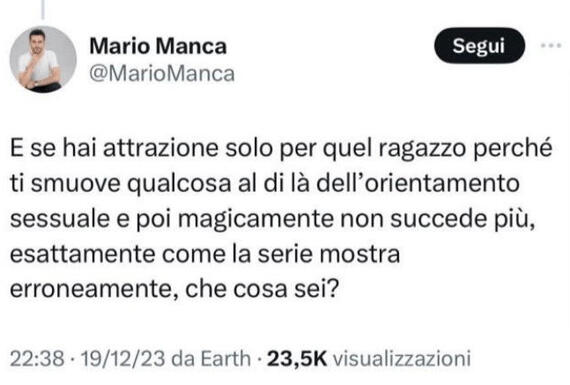
8) Labels that most HEALTHY people try to break away from (Mario Manca via X)
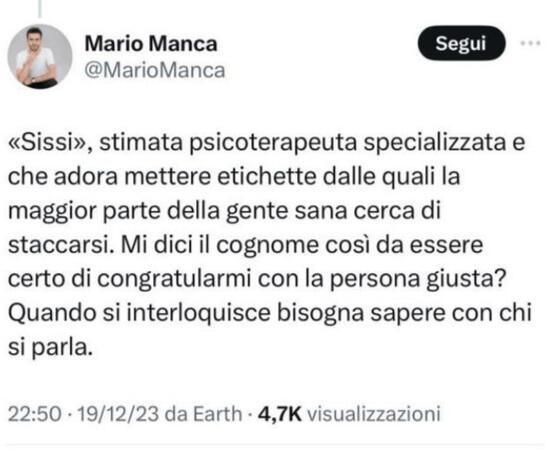
9) Manuel seemed to be attracted to Simone only once leaving that to be an isolated episode (Mario Manca via VF)10) Manuel seems perfectly happy and peaceful like this. From what we have seen, Manuel is interested in girls, except for that night (Mario Manca via VF)
11) We rediscover ourselves, we change (Alessandro Gassmann via X)
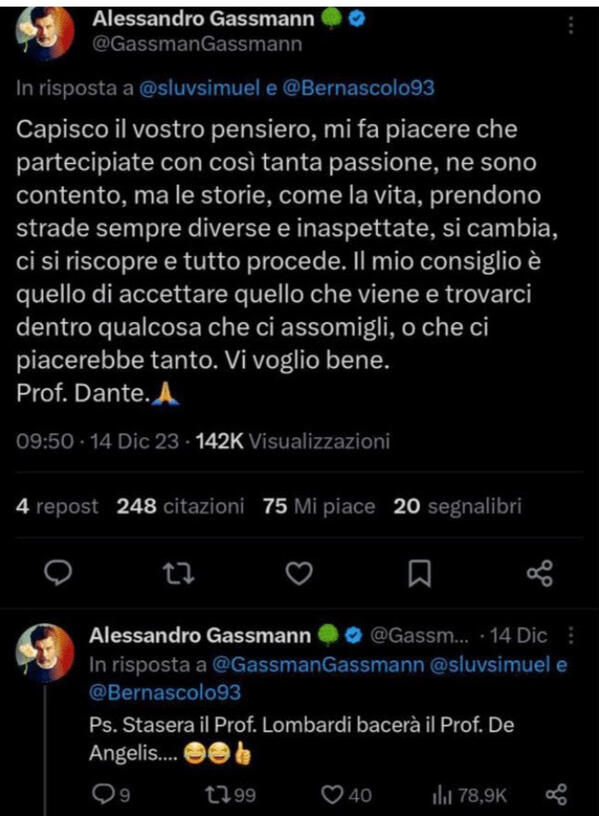
Vanity Fair itself spoke about bisexuality in one of its old articles:
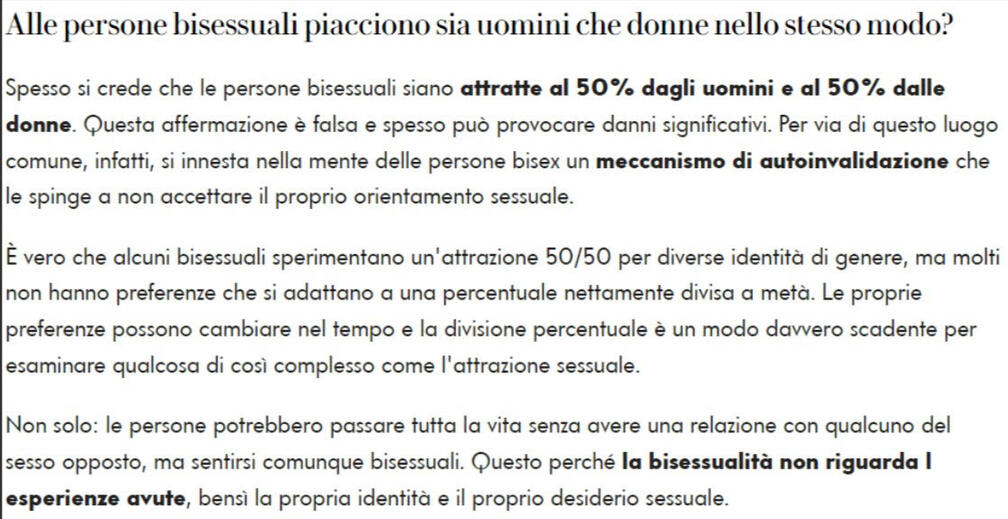
So if bisexuality isn't 50/50, why can't Manuel - who has been on screen three times with women (Alice, Chicca, Nina) and once on screen with a man (Simone) - be bisexual? Why instead the character of Mimmo - who was once on screen with a man (Simone) and once off screen with a woman (Dalila) - can be defined by newspapers such as Vanity Fair ("It remains that bisexuality within by A Professor - it would be a lie to say otherwise - there is, and it is Mimmo's)
as the right representation of bisexuality? Are we so sure that Mimmo is bisexual if the same screenwriter Sandro Petraglia also presents him as "a heterosexual boy who approaches Simone and then says: let's not think too much about it"?
In fact, delving into the relationship between Simone and Manuel, Manuel's bisexuality would have been undeniable, while delving into the history between Simone and Mimmo, Mimmo's sexuality remains vague and never declared. His character could easily be interpreted as both bisexual and homosexual. Bisexual precisely because he has ALSO been with both sexes. Homosexual because his story with Dalila could be interpreted as a boy who believed himself to be heterosexual when he was with her (with whom, however, he was not in love just like Simone with Laura in the first season) but then turns out to be homosexual by falling in love with a boy for the first time (just like what happened to Simone who fell in love with Manuel in the first season).
Mimmo in fact achieved the effect hoped for by the screenwriters: to divert attention from the bi erasure, given that a part of the public (including the queer one), as soon as another couple of men was proposed, set aside the need to see a representation of bisexuality. Indeed, some have invited us to be satisfied with this homosexual representation. But while homosexual and bisexual experiences may have similarities, they also have differences that deserve to be shown. We can't reduce everything to "YOU ASK TOO MANY QUESTIONS".
What would it mean if an audience asked questions about what they were watching? Having to explain on Rai 1 what bisexuality is. But, after this second season, we have ascertained that there is no intention or courage to do so (neither with Mimmo nor with Manuel).Furthermore, the screenwriter Sandro Petraglia says (again in the famous interview for Fanpage) that he hasn't even seen the second and third seasons of Merlì. So, even if the public was clamoring for the NATURAL continuation of Manuel and Simone's story, he decided to go his own way. But we have collected in a list
all the parallels between Un Professore and Merlì, demonstrating the fact that Mr. Petraglia did not decide to keep only the general storyline of the nonconformist professor, but almost everything EXCEPT THE BISEXUALITY OF ONE OF THE MAIN CHARACTERS, and this further confirms his biphobia, the biphobia of the production company Banijay Italia and of Rai itself, who approved and broadcast what he wrote.As if all this wasn't enough, the lack of courage to give the right representation to an entire bisexual community, queerbaiting is also shown.What is queerbaiting?
“Queerbaiting” is a marketing technique for fiction and entertainment in which creators hint at, but do not depict, same-sex romance or other LGBTQ+ representation. The purpose of this method is to attract ("bait") a queer or straight ally audience with the suggestion or possibility of relationships or characters that appeal to them, while not alienating homophobic members of the audience or censors by actually portraying queer relationships.Where is queerbaiting shown in the TV series Un Professore?
Throughout the first season with the character of Manuel because, even though he is conceived and written as a heterosexual character, we have an entire season made up of glances between Simone and Manuel which will culminate on the evening of Simone's birthday with a kiss (which Manuel himself starts) and with making love (as written by Rai in the official synopsis).
After this night of love Manuel will utter the words "with you it's different" and "it was fun", despite still being confused and in denial. Queerbaiting is also present in the second season because during the first four episodes, many months after what happened that night under the construction site, Manuel shows himself jealous of his "friend" Simone, so much so that he goes to his "rival" Mimmo to tell him to “stay away from Simone” (scene in the library); furthermore, the two "contenders" throw challenging glances at each other for many episodes, ending up arguing a second time (scene in the corridor) to the tune of "I told you to stay away from Simone". Was it really necessary to have a straight character do and say all these things? Couldn't the straight guy just deny Simone the kiss at the museum (season 1) without everything that followed afterwards?Where is queerbaiting shown during the promotion of the second season of Un Professore?
The most striking example is the video that Banijay Italia published on social profiles on November 16, in which he has the actors interpret, after a guest appearance on La Vita In Diretta (in which the Banijay workers themselves were present behind the scenes), a skit in which “Manuel” says to “Simone” (talking about Mimmo): “he always gets in the way” alluding to a queer triangle that would never happen.
More queerbaiting was done with promotional photos that served no purpose for the plot:
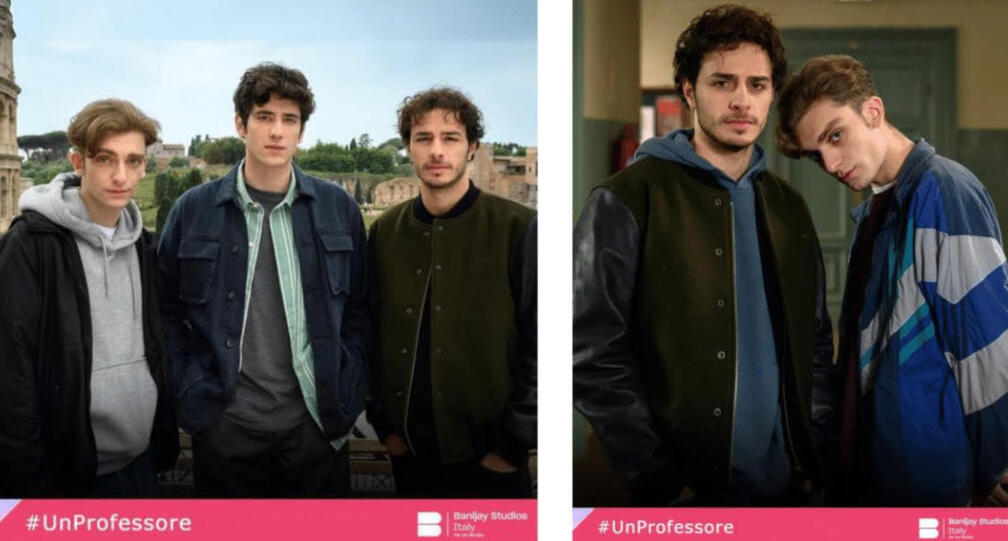
These are just two examples, because today we feel like being good.But was Un Professore 2 at least capable of treating with due attention the only clearly declared queer sexual orientation (Simone's homosexuality)? NO. Simone is the victim, in both the first and second seasons, of continuous outing by his father Dante (by “outing” we mean the practice of making public a person's sexual orientation or gender identity without his consent; outing someone is a serious lack of respect towards a person who is becoming/has become aware of their sexual orientation, as well as a serious violation of privacy).
In the second season, Simone is also the victim of a homophobic attack which ends with the words "it was a fight which started for stupid reasons"; furthermore, the bully will not suffer any repercussions or punishment, will not show repentance and will never apologize to Simone. Indeed, the homophobic aggression seems just a ploy to bring Mimmo and Simone closer together, without teaching the viewer anything.
Even their love story is the victim of censorship, such as the clear cut to send the advertisement as soon as the two boys take off their jackets to make love. Were these same straight scenes ever cut? NO.
So can we really be satisfied if the great strides made by Rai were to show 2/3 kisses in broad daylight (we think it's the minimum)? Can we be satisfied with seeing how even in the finale Simone was the only character - after a season in which no one ever knew anything about his story with Mimmo as if it was something to hide - who had to give up his happy ending while all the other straight couples had that?#JusticeForManuelFerro is on:
Twitter (@JusticeForMF)
IG (@justiceformf)
TikTok (@justiceformf)
Follow us.